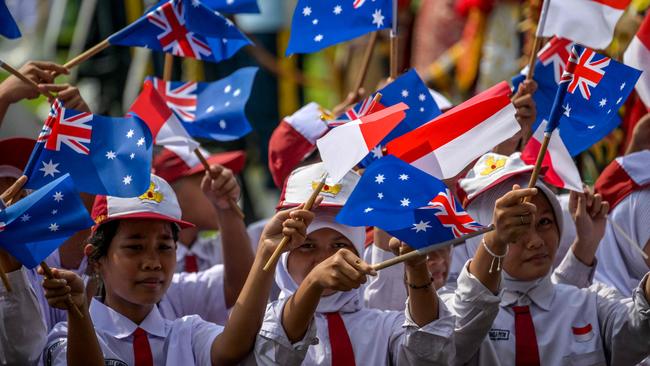Indonesian language studies in ‘death rattle’ as another university course bites the dust
Experts warn Australia risks losing its competitive advantage in Indonesia unless the government makes an effort to reverse the decline in Indonesian language and literacy skills.

Indonesian language studies are in a “death rattle” with high schools and universities abandoning the subject at alarming rates, despite the federal government insisting Asian language skills and literacy are key to the success of its Southeast Asia investment strategy.
The University of Tasmania is the latest to propose cutting Indonesian language studies from its curriculum as a result of a dip in demand directly linked to what advocates say is the “long-term neglect” of school-based Asian language education.
It follows a string of recent cuts in universities and schools, including Melbourne’s Scotch College and Darwin’s Essington School, which announced last year they were phasing out two of the country’s longest-running Indonesian courses.
The collapse in Indonesian language courses, and Asian languages study more broadly, has sparked multiple warnings from business leaders and public policy experts that Australia risks losing its competitive advantage in its own neighbourhood, on track to be the world’s fourth biggest regional economy by 2040, if the federal government does not put funding behind its Asia Century rhetoric to reverse the decline.
Just last week Anthony Albanese trod a well-worn path to Jakarta to acknowledge the importance of the nation’s largest near neighbour, declaring “no relationship is more important to Australia … and none is more important to the prosperity, security and stability of the Indo-Pacific than Indonesia”.
Indonesia’s enduring importance was also underlined last month when it was revealed Russia was lobbying Jakarta for permanent access to an air force base just 1300km from the Australian mainland. Meanwhile, a record 1.5 million Australians holidayed there last year.
Yet with the University of Tasmania now flagging an end to its Indonesian language course, only 11 universities nationwide would offer Indonesian language studies, down from twice that figure in 2001. Swinburne University announced in 2021 it was phasing out all language studies, while Western Sydney and La Trobe universities also cut Indonesian during the pandemic.
Only 79 NSW year 12 students are studying Indonesian language, 11 West Australian schools offer the subject, while no Queensland high schools at all teach Year 12 Indonesian, according to data compiled by the Australian Consortium of In-Country Indonesian Studies.
Victoria has 50 secondary schools teaching Year 12 Indonesian but “everywhere outside of Victoria it is in a death rattle”, ACICIS director Liam Prince says.
“We are dismantling a national asset one program at a time. These closures are not isolated – they are cumulative. And they are leaving us dangerously underprepared for the Indo-Pacific future everyone agrees is coming.
“Until we rectify the problem in schools so that we have a sustainable level of school leaver students we won’t have a sustainable level of students wanting to do university-level studies.”
Australia Indonesia Institute chairwoman Lydia Santoso says Australia risks “losing an entire generation of graduates with the linguistic skills essential for engaging with one of our most important neighbours” if it did not reverse the current decline.
“A diminished pipeline of Southeast Asia-literate Australians weakens our capacity to engage effectively in diplomacy, trade and defence,” said Ms Santoso, who also chairs the NSW chapter of the Australia Indonesia Business Council.
Melbourne University Indonesian Law expert Tim Lindsey says the problem is not just that successive Australian governments have shown no interest in funding Asian languages, but that Australians themselves are not interested in learning one. Australia now has the lowest number of bilingual speakers per capita in the OECD.
“Australia used to be an unrivalled centre for Indonesian literacy and language but it has just fallen apart,” Professor Lindsey told The Australian.
“We will undoubtedly pay for this because we are already way down the list of investors in Indonesia, a country of 300 million people that we should be the world authority on, and more engaged with than anyone.”
Mr Prince said a funding commitment of $84m a year – equivalent to the level of investment under the Paul Keating Labor government – could reverse the decline in Indonesian language studies.
“That would be enough to start the process again of teaching Indonesian through the education system, but it needs baseline funding and a national strategy to address it.”




To join the conversation, please log in. Don't have an account? Register
Join the conversation, you are commenting as Logout